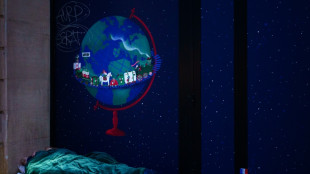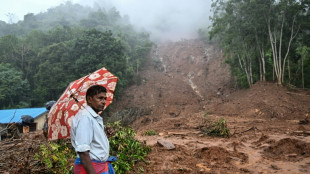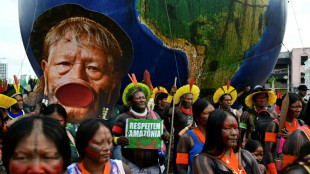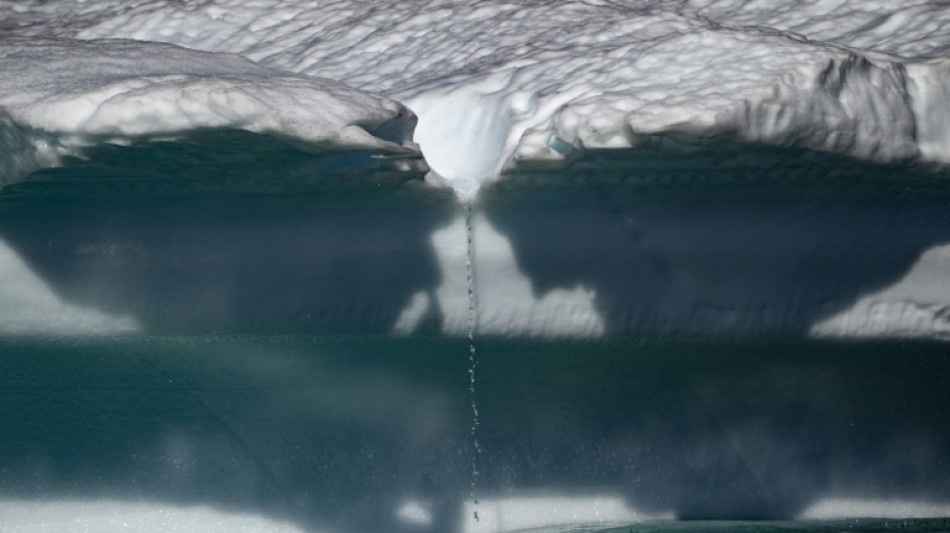
-
 Fritz struggling with 'serious tendonitis' ahead of Australian Open
Fritz struggling with 'serious tendonitis' ahead of Australian Open
-
Sprawling CES gadgetfest a world stage for AI and its hype

-
 Zverev admits 'a lot of catching up' to reel in Alcaraz, Sinner
Zverev admits 'a lot of catching up' to reel in Alcaraz, Sinner
-
Smith bats away retirement talk as he keeps England guessing

-
 NFL MVP Allen 'good to go' to extend streak in stadium farewell
NFL MVP Allen 'good to go' to extend streak in stadium farewell
-
Grok under fire after complaints it undressed minors in photos

-
 UN chief calls on Israel to reverse NGOs ban in Gaza
UN chief calls on Israel to reverse NGOs ban in Gaza
-
Steelers' Watt 'excited' to return after lung injury

-
 Lens move four points clear of PSG at top of Ligue 1
Lens move four points clear of PSG at top of Ligue 1
-
Tesla loses EV crown to China's BYD in 2025 as sales slip

-
 Sparklers blamed for deadly Swiss bar fire
Sparklers blamed for deadly Swiss bar fire
-
Frank confident he can win over disgruntled Spurs fans

-
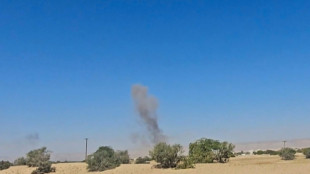 Yemen separatists launch two-year independence transition as strikes kill 20
Yemen separatists launch two-year independence transition as strikes kill 20
-
6.5-magnitude quake shakes Mexico City and beach resort

-
 Tech campaigner decries US 'punishment' after visa sanctions
Tech campaigner decries US 'punishment' after visa sanctions
-
Swiss send dozens injured in bar fire abroad for treatment
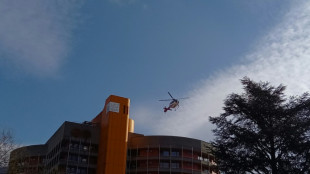
-
 Stokes urges England to stick with McCullum despite Ashes defeat
Stokes urges England to stick with McCullum despite Ashes defeat
-
Yemen separatists announce two-year independence transition in shock move

-
 USA Olympic squad of NHL stars heavy on Four Nations talent
USA Olympic squad of NHL stars heavy on Four Nations talent
-
Milei eases tax evasion rules to draw out 'mattress dollars'

-
 France hooker Mauvaka returns after eight-month layoff
France hooker Mauvaka returns after eight-month layoff
-
Nigeria police charge fatal Joshua crash driver with dangerous driving

-
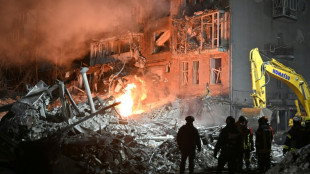 Russia scores highest Ukraine gains since first year of war
Russia scores highest Ukraine gains since first year of war
-
Guardiola reaffirms City contract as Maresca speculation builds

-
 Iran's protests: What we know
Iran's protests: What we know
-
2025 was UK's hottest and sunniest year on record
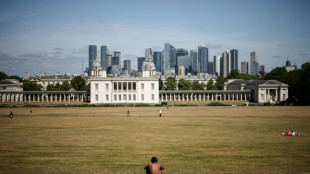
-
 Strasbourg's Rosenior coy on Chelsea speculation
Strasbourg's Rosenior coy on Chelsea speculation
-
Swiss bar blaze suspicions fall on sparklers waved by staff

-
 US woman killed in rare suspected mountain lion attack
US woman killed in rare suspected mountain lion attack
-
Slot admits Liverpool's season has been 'constant battle'

-
 Spurs forward Johnson completes Palace switch
Spurs forward Johnson completes Palace switch
-
Endrick absent from Lyon year opener but 'adapting well': coach

-
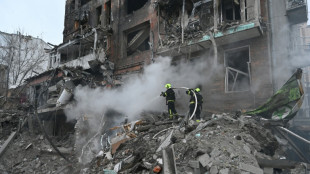 Ukraine says 19 wounded in Russian strike on Kharkiv housing area
Ukraine says 19 wounded in Russian strike on Kharkiv housing area
-
6.5-magnitude quake shakes Mexico City
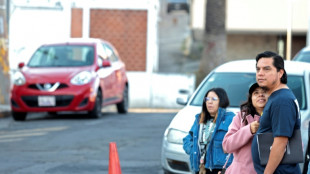
-
 Tesla sales slip as it loses EV crown to China's BYD in 2025
Tesla sales slip as it loses EV crown to China's BYD in 2025
-
UK sees record-high electricity from renewables in 2025: study
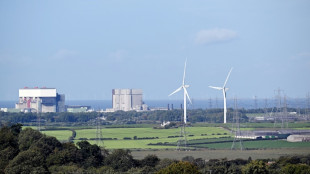
-
 Budanov: Enigmatic spy chief set to become Zelensky's top aide
Budanov: Enigmatic spy chief set to become Zelensky's top aide
-
Greece and Argentina make winning starts at United Cup

-
 Nortje gets nod for South Africa's T20 World Cup campaign
Nortje gets nod for South Africa's T20 World Cup campaign
-
Arteta urges Arsenal to break New Year Premier League curse

-
 Norway closes in on objective of 100% electric car sales
Norway closes in on objective of 100% electric car sales
-
Dani Alves invests in Portuguese third division club

-
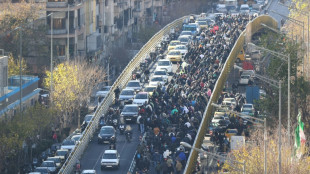 Trump says US will 'come to their rescue' if Iran kills protesters
Trump says US will 'come to their rescue' if Iran kills protesters
-
Orsted files lawsuit against US suspension of wind turbine leases

-
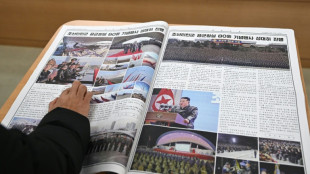 South Koreans now free to read North's newspaper, once banned as seditious
South Koreans now free to read North's newspaper, once banned as seditious
-
Stocks make bright start to 2026

-
 Bashir, Potts in England squad for final Ashes Test
Bashir, Potts in England squad for final Ashes Test
-
Argentina topple Spain for winning United Cup start

-
 Champions Narvaez and Ruegg to defend Tour Down Under titles
Champions Narvaez and Ruegg to defend Tour Down Under titles
-
'Are they OK?': desperate search for the missing after Swiss fire
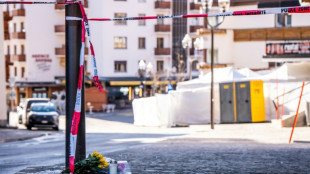

Humanity deep in the danger zone of planetary boundaries: study
Human activity and appetites have weakened Earth's resilience, pushing it far beyond the "safe operating space" that keeps the world liveable for most species, including our own, a landmark study said Wednesday.
Six of nine planetary boundaries -- climate change, deforestation, biodiversity loss, synthetic chemicals including plastics, freshwater depletion, and nitrogen use -- are already deep in the red zone, an international team of 29 scientists reported.
Two of the remaining three -- ocean acidification along with the concentration of particle pollution and dust in the atmosphere -- are borderline, with only ozone depletion comfortably within safe bounds.
The planetary boundaries identify "the important processes that keep the Earth within the kind of the living conditions that prevailed over the last 10,000 years, the period when humanity and modern civilisation developed", said lead author Katherine Richardson, a professor at the University of Copenhagen's Globe Institute.
The study is the second major update of the concept, first unveiled in 2009 when only global warming, extinction rates, and nitrogen had transgressed their limits.
"We are still moving in the wrong direction," said co-author Johan Rockstrom, director of the Potsdam Institute for Climate Impact Research (PIK) and a co-creator of the schema.
"And there's no indications that any of the boundaries" -- except the ozone layer, slowly on the mend since the chemicals destroying it were banned -- "have started to bend in the right direction", he told journalists in a briefing.
"This means we are losing resilience, that we are putting the stability of the Earth system at risk."
The study quantifies boundaries for all nine interlocking facets of the Earth system.
- Headed for disaster -
For biodiversity, for example, if the rate at which species disappear is less than 10 times the average extinction rate over the last 10 million years, that is deemed acceptable.
In reality, however, extinctions are occurring at least 100 times faster than this so-called background rate, and 10 times faster than the planetary boundary limit.
For climate change, that threshold is keyed to the concentration of atmospheric CO2, which remained very close to 280 parts per million (ppm) for at least 10,000 years prior to the industrial revolution.
That concentration is today 417 ppm, far above the safe boundary of 350 ppm.
"On climate, we're still following a pathway that takes us unequivocally to disaster," said Rockstrom. "We're headed for 2.5C, 2.6C or 2.7C -- a place we haven't seen for the past four million years."
"There's no evidence whatsoever that humans can survive in that environment," he added.
Thousands upon thousands of chemical compounds created by humans -- from micro-plastics and pesticides to nuclear waste and drugs that have leached into the environment -- were quantified for the first time in the new research, and found to exceed safe limits.
Likewise for the depletion of "green" and "blue" water, freshwater coming from soil and plants on the one hand, and from rivers and lakes on the other.
- Setting limits -
An important finding of the new update is that different boundaries feed off and amplify each other.
The study examines in particular the interaction between increasing CO2 concentration and damage to the biosphere, especially forest loss, and projects temperature increases when one or both increase.
It shows that even if humanity rapidly draws down greenhouse gas emissions, unless destruction of carbon-absorbing forests is halted at the same time rising global temperatures could tip the planet onto a trajectory of additional warming that would be hard to stop.
"Next to climate change, integrity of the biosphere is the second pillar for our planet," said co-author Wolfgang Lucht, head of Earth System Analysis at PIK.
"We are currently destabilising this pillar by taking out too much biomass, destroying too much habitat, deforesting too much land."
All the boundaries can be brought back into the safe operating space, the study concluded.
"It's just a question of setting limits for the amount of waste we put into the open environment and the amount of living and non-living raw materials we take out," said Richardson.
Hotly debated at first, the planetary boundaries framework quickly became a pillar of Earth system science, with its influence extending today into the realm of policy and even business.
P.Mathewson--AMWN
